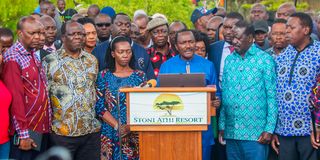A categorical parting of ways awaits any person who dares disobey Raila

Azimio Coalition leaders (from left) Jermiah Kioni, Wyclife Oparanya, Martha Karua, Kalonzo Musyoka, Raila Odinga and Eugene Wamalwa address the press at Stoni Athi Resort in Machakos County on April 6, 2023.
The preponderant sentiment subsequent to Raila Odinga’s announcement halting his nationwide campaign of ‘peaceful’ protests was relieved perplexity.
Respite from the vicious onslaught on peace and normalcy was highly welcome to Kenyans eager to resume their normal lives.
The perplexity was heavily tinged with outrage and disappointment, because both Odinga’s supporters and detractors could not fail to discern the dazzling omission from his entire address of the auxilliary pretexts of the maandamano agenda.
Odinga’s many critics were sweetly and publicly vindicated in their assertion that the cost of living was a fig leaf to cover a naked pursuit of power through a cynical, ‘Handshake’ backdoor, and that Odinga was deceiving the nation and taking his supporters for fools.
His supporters were dismayed to witness their icon throw them under the bus in pursuit of obscure political aspirations.
Holy Week
Odinga, ODM and Azimio have spent the Holy Week in assiduous pursuit of atonement. They have instigated a campaign of ‘lawfare’— the weaponisation of judicial authority to secure partisan interests and disadvantage adversaries.
One objective of this campaign is to disrupt, delay and disable the government from undertaking any mandate that touches on Odinga’s demands, for example in the constitution of the IEBC Selection Panel.
The other is to re-legitimise Odinga’s maandamano agenda, through subtle reputational laundering, by authoritatively, or at least clamorously, imputing culpability for maandamano-associated criminality to the police.
Just in case the International Criminal Court or other accountability mechanism come calling, Odinga’s crew have already declared that they are not afraid of it, and, furthermore, that the entire international community are compromised interlopers of the rankest calibre who should keep off Kenya’s parochial business.
Finally, Odinga’s technical apparatus is busy in the courts instituting causes whose primary function is to anchor remedial discourse and mitigating narratives.
Clearly this edition of maandamano has not gone well at all, and it is unsurprising that ubiquitous sotto voce allusions to an Odinga in desperate need for an exit last Sunday.
It stands to reason by all accounts: 2023 is not 1992 or 1997. 2022 was not 2007 by any stretch of the imagination, and talk of a National Accord is as misplaced as demands for multiparty democracy, or the release of political prisoners, or the end of detention without trial.
Maoist suits
Odinga himself, the clean-shaven, business suit-donning, pleasant grandfatherly image is a far cry from the bearded menace in Maoist suits of the 1980s and 90s, whose associates were typically prison-hardened subversives trained in guerrilla warfare. For better and for worse, it is a different time.
What has not changed, however, is Odinga’s modus operandi, which is chiefly defined by rapid oscillation between contradictory strategic preferences, and a curious ability to denote speedy movement in circles as stupendous progress in the right direction.
What happened with the international community is astonishing yet predictable, because it is typical of Odinga’s tactical repertory.
As long as one remembers, Odinga zealously believed that Kenya must listen and obey the international community, specifically western powers.
To be fair, these powers did much to facilitate Odinga and his politics.
From pressure to liberalise politics in the late 1980s, the escapades of the nyama choma envoy and Odinga’s nifty flight to exile, to IPPG in the late 1990s, the ‘vomiting on our shoes’ condescension of the early Narc era and the insistence on ‘genuine power sharing’ in 2008, the international community has served Odinga very well.
As a result, Odinga’s confidence in Western powers as dependable instruments of his ambition has been absolute.
That is why he has always wanted foreigners to run important organisations and lead critical institutions, from political arbitration to election management, national security and the judiciary.
What has changed, to make Odinga so furious with the international community?
It made the mistake of endorsing the last election. A categorical parting of ways is inevitable whenever any person or organisation disobeys Odinga.
The international community is now ‘interfering’, even though Odinga has always invited it to run our country.
Ask the Supreme Court, which enjoyed a wonderful honeymoon until it dismissed Odinga’s petition in 2013.
However, it redeemed itself for a delicious spell in 2017 when it nullified the presidential election, only to nullify the BBI, which had cost Odinga a Handshake with a man whose legitimacy he contests to date. Unforgivable! The IEBC will always be deficient, insofar as Odinga is yet to win an election.
In 2010, Odinga visibly, loudly, vigorously and impatiently led the overwhelmingly successful government campaign that promoted the ratification of the new constitution. This spectacular triumph was intended to furnish political capital to enable Odinga win the 2013 election. He lost. He has been concocting constitutional amendment schemes ever since. The constitution’s legitimacy is questionable in Odinga’s eyes and the extra-constitutional option is perfectly appropriate.
To properly measure Odinga, consider what happened in the last election, and understand that everything now is about the next election.
Mr Ng’eno is an advocate of the High Court





